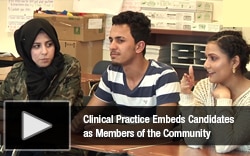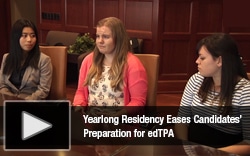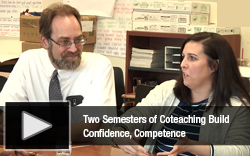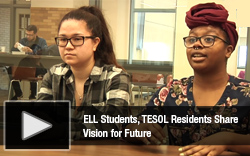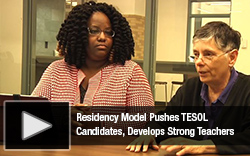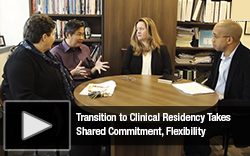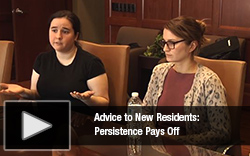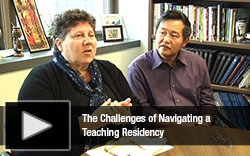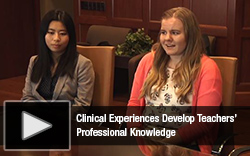29 Aug2019
By Genesis Gonzalez
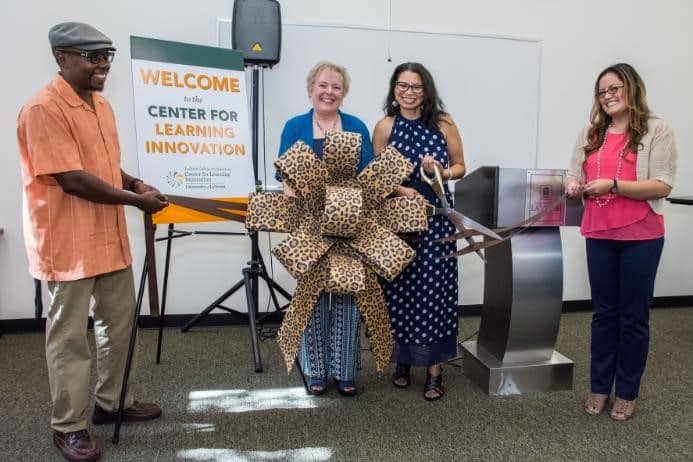
This article and photo originally appeared on the University of La Verne website and are reprinted with permission.
The University of La Verne’s LaFetra College of Education welcomes the new Center for Teacher Leadership & Learning Innovation, a first-of-its-kind lab, designed to support and train educators from across Los Angeles County and the Inland Empire in 21st-century learning competencies.
“As a College of Education, which prepares community and school leaders, support providers and teachers, it is imperative that our faculty be
22 Aug2019
By Emily Stembridge
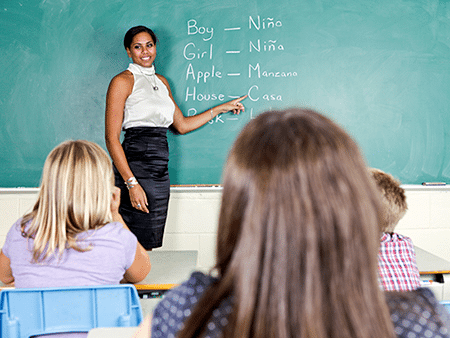 The IMPACT-PD grant—Improving Preschoolers’ Acquisition of Language through Coaching Teachers and Professional Development—is playing an integral role in providing preschool educators the tools they need to help their students develop proficiency in English as a second language.
The IMPACT-PD grant—Improving Preschoolers’ Acquisition of Language through Coaching Teachers and Professional Development—is playing an integral role in providing preschool educators the tools they need to help their students develop proficiency in English as a second language.
The United States Department of Education National Professional grant, funded by the Office of English Language Acquisition, aims to provide educators with professional development opportunities for improving instruction of dual-language learners in preschool.
The IMPACT-PD program, a partnership between the University of Alabama at Birmingham and the Alabama Department of Early Childhood Education, focuses on four goals to further training and education to children learning English early in life:
16 Aug2019
By Lynn M. Gangone
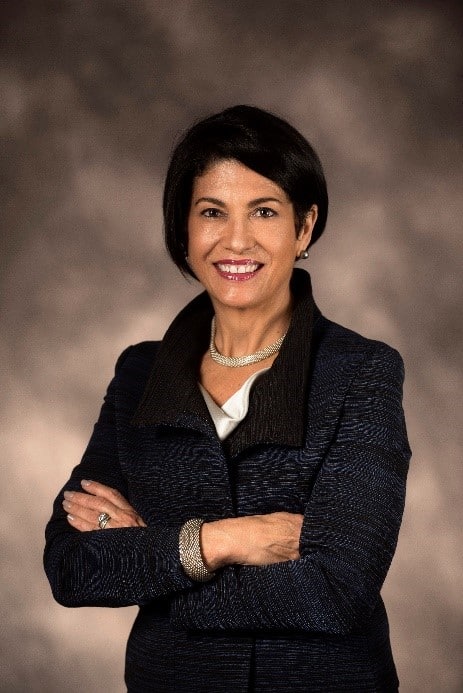 Educators and students are facing unprecedented times. The challenges both students and their teachers confront today vastly affects the efficacy of even the best educator’s efforts to create and foster students’ zeal for learning and to contribute to the society they will one day shape. Yet, educators must stay committed to fulfilling their social responsibility now more than ever before.
Educators and students are facing unprecedented times. The challenges both students and their teachers confront today vastly affects the efficacy of even the best educator’s efforts to create and foster students’ zeal for learning and to contribute to the society they will one day shape. Yet, educators must stay committed to fulfilling their social responsibility now more than ever before.
What Should Social Responsibility Look Like in the Teaching Profession?
This varies from educator to educator, so the answer to this question is complicated and multi-faceted.
Education is about opening minds, creating new knowledge. It is an expansive endeavor. In theory, education should provide us with the understanding and capacity of what it means to be a citizen of this nation and the world. Our nation’s founders understood the importance of an educated citizenry. Today, I believe that we need educators to support both a students’ academic development and citizen development.
13 Aug2019
By Katrina Norfleet

The September/October 2019 issue of the Journal of Teacher Education (JTE) is now available online, while printed copies are arriving in the mail to subscribers around the country. Below is a summary of the articles included in Vol. 70, Issue 4, 2019:
In “Teacher Agency and Resilience in the Age of Neoliberalism,” members of the JTE editorial team, Tonya Bartell, Christine Cho, Corey Drake, Emery Petchauer, and Gail Richmond, address how the articles in this issue provide insights into ways educator preparation programs can support teachers in developing and enacting agency. They discuss how making small shifts or adaptations in everyday teaching practices can create more just and equitable teaching and learning.
In the paper, “Whiteness as a Dissonant State: Exploring One White Male Student Teacher’s Experiences in Urban Contexts,” Stephanie Behm Cross of Georgia State University, Nermin Tosmur-Bayazit of Fitchburg State University, and Alyssa Hadley Dunn of Michigan State University, suggest that Whiteness itself is a dissonant state. The authors argue that
05 Aug2019
By Jane E. West

This blog post is written by AACTE consultant Jane West and is intended to provide update information. The views expressed in this post do not necessarily reflect the views of AACTE.
The Senate left town yesterday following on the heels of the House bringing the five-week summer recess into full bloom. Congress will reconvene in September, and thanks to the passage of the budget deal, move forward in adopting 12 appropriations bills, including one with education spending. However, obstacles remain.
29 Jul2019
By Jane E. West
This blog post is written by AACTE consultant Jane West and is intended to provide update information. The views expressed in this post do not necessarily reflect the views of AACTE.
Congress is heading out of town—the House leaving today for a six-week recess and the Senate leaving at the end of next week. With the amazing budget deal headed for the finish line, September promises to be full of appropriations bills, including the education funding bill we’ve all been waiting for.

Unbelievable: Congress and the White House Make a Deal on 2 Year Budget Caps and Debt Ceiling
In a stunning proactive bipartisan move, the Congress and the White House have agreed to a two-year budget deal. This frees up all lawmakers and the president to focus on the 2020 elections without the threat of a government shutdown. Key features of the deal include the following:
17 Jul2019
By Jerrica Thurman and Donna Sacco
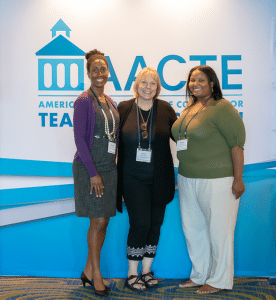 AACTE’s Jerrica Thurman first met Donna Sacco in 2015. Sacco was one of three doctoral students from George Mason University (GMU) who worked as an AACTE education intern, assisting in advocating for high-quality preparation programs and with its marketing communications. Thurman was pleasantly surprised when she saw Sacco at AACTE’s 2019 Washington Week with her two Holmes doctoral students from the University of North Carolina at Charlotte (UNCC). It was during her AACTE internship that Sacco learned about the Holmes Program and determined to make a personal contribution to help diversify the teacher workforce by becoming a Holmes advocate. The following summary highlights an interview Thurman had with Sacco about her journey from an intern to a change agent in education.
AACTE’s Jerrica Thurman first met Donna Sacco in 2015. Sacco was one of three doctoral students from George Mason University (GMU) who worked as an AACTE education intern, assisting in advocating for high-quality preparation programs and with its marketing communications. Thurman was pleasantly surprised when she saw Sacco at AACTE’s 2019 Washington Week with her two Holmes doctoral students from the University of North Carolina at Charlotte (UNCC). It was during her AACTE internship that Sacco learned about the Holmes Program and determined to make a personal contribution to help diversify the teacher workforce by becoming a Holmes advocate. The following summary highlights an interview Thurman had with Sacco about her journey from an intern to a change agent in education.
What piqued your interest in the issues of teacher diversity as a doctoral student at George Mason University and student intern at AACTE?
Before my doctoral program, I was a special educator with a master’s degree in bilingual special education. For my entire career, my focus has been on culturally and linguistically responsive instructional practices. Part of my drive came from the stories my father told me about the obstacles he experienced in his childhood as the son of Italian immigrants. He was a brilliant man but never went to college. He had one advocate who helped mentor him in appreciating the arts but had no teachers who were advocates, role models, or who understood his background. Once I began researching teacher education, I was surprised to learn that the teaching force is composed of roughly 80% white female teachers. How had I missed that obvious point? I am a white female who was teaching mostly boys of
11 Jul2019
By Jerrica Thurman
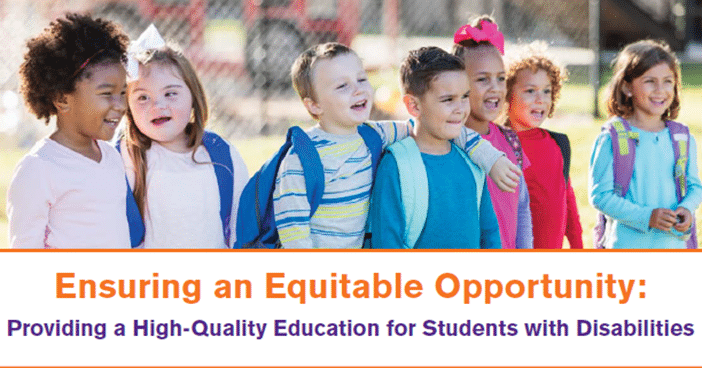
The Council of Chief State School Officers (CCSSO) recently released Ensuring an Equitable Opportunity: Providing a High-Quality Education for Students with Disabilities, a report that details policy and practice considerations around individualized education plans chiefs and state education leaders can reflect upon and implement in ensuring all students, especially students with disabilities, have access to a high-quality education. Students with disabilities are provided with an individualized education program (IEP) to ensure they receive specially-designed instruction and related services. The IEP is the primary mechanism for ensuring students with disabilities receive the right educational content and rigor at the right moment in their education.
The Education for All Handicapped Children Act of 1975 marked an historic win for civil rights when the doors to public education were opened for all students. For the first time, children with disabilities had access to a public education and the hope of a productive and fulfilling future. Today, the Individuals with Disabilities Education Act of 2004 (IDEA), the most recent iteration of that law, aims to deliver on that promise; namely, that all students with disabilities have equitable access to a free appropriate public education (FAPE) in the least restrictive environment.
05 Feb2019
By Katrina Norfleet
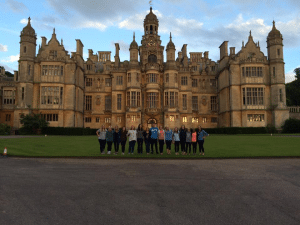 AACTE is delighted to announce Butler University College of Education as the recipient of the 2019 AACTE Best Practice Award in Support of Global and International Perspectives for its Global Network for Teacher Preparation program. Kelli Esteves, Butler College of Education (COE) associate professor and global coordinator, will be presented with the award at the AACTE 71st Annual Meeting, February 22-24, in Louisville, KY.
AACTE is delighted to announce Butler University College of Education as the recipient of the 2019 AACTE Best Practice Award in Support of Global and International Perspectives for its Global Network for Teacher Preparation program. Kelli Esteves, Butler College of Education (COE) associate professor and global coordinator, will be presented with the award at the AACTE 71st Annual Meeting, February 22-24, in Louisville, KY.
Butler’s Global Network for Teacher Preparation is a comprehensive program designed to bring international and multicultural perspectives into their teaching through experiential learning in other countries. Made up of local and global partners, the network has sent faculty and students around the world and has hosted educators on Butler’s campus and in its lab schools from Sweden, Colombia, Italy, Australia, and China to ensure its teacher candidates are exposed to international perspectives and curriculum. The network’s local partners include the College of Education’s two Reggio-inspired Lab Schools, Shortridge International Baccalaureate World School (lab high school) and Butler’s Center for Global Education. Global partners are the Institutes of Higher Education student exchange partners, including Uppsala University, Sweden, University of Tasmania, and the Education University of Hong Kong; and School partner for student and educator exchange—Vallentuna Gymnasium in Sweden.
05 Feb2019
By Jerrica Thurman
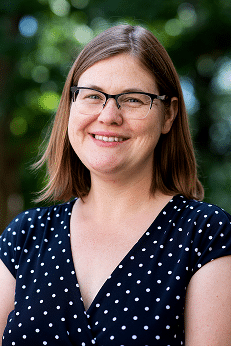 AACTE will honor announced Emily Evans Fanaeian as the recipient of the 2019 AACTE Outstanding Dissertation Award for Preparing Pre-service Teaches for Working with Linguistically Diverse Students: Examining University Teacher Preparation Programs Across the United States. The author completed her dissertation for the Ph.D. at the University of Wisconsin-Madison School of Education and is now the interim director of English as a Second Language/Bilingual Graduate Programs for the School of Education at Edgewood College (Madison, WI). She will be recognized formally with the award at the AACTE 71st Annual Meeting, February 22-24, in Louisville, KY.
AACTE will honor announced Emily Evans Fanaeian as the recipient of the 2019 AACTE Outstanding Dissertation Award for Preparing Pre-service Teaches for Working with Linguistically Diverse Students: Examining University Teacher Preparation Programs Across the United States. The author completed her dissertation for the Ph.D. at the University of Wisconsin-Madison School of Education and is now the interim director of English as a Second Language/Bilingual Graduate Programs for the School of Education at Edgewood College (Madison, WI). She will be recognized formally with the award at the AACTE 71st Annual Meeting, February 22-24, in Louisville, KY.
In her dissertation, Evans Fanaeian designed an ambitious multiple case study to examine the ways in which university-based teacher education programs take up the task of preparing general education teacher candidates to provide instruction to English learners. The University of Wisconsin-Madison Director of Teacher Education Center, Kimber Wilkerson, explained: “Dr. Evans Fanaeian’s dissertation research provides many important implications for teacher education. Acknowledging the importance of preparing general educators to meet the needs of the wide diversity of learners in our schools, Dr. Evans Fanaeian designed an ambitious multiple case study to examine the ways in which university-based teacher education programs take up the task of preparing general education teacher candidates to provide instruction to English learners. In this study, she surfaces the very real local and contextual constraints that teacher educators face when attempting to add complexity to teacher preparation programs. This is particularly important at a time when teacher preparation programs face pressure to reduce the time and cost toward degree. Dr. Evans Fanaeian’s research provides insightful guidance to teacher educators considering different approaches to incorporating new content. Her recommendations for practice are thoughtful as well as pragmatic, and could be applied conceptually to other types of expertise beyond educating English learners.”
14 Sep2018
By Wanda J. Blanchett
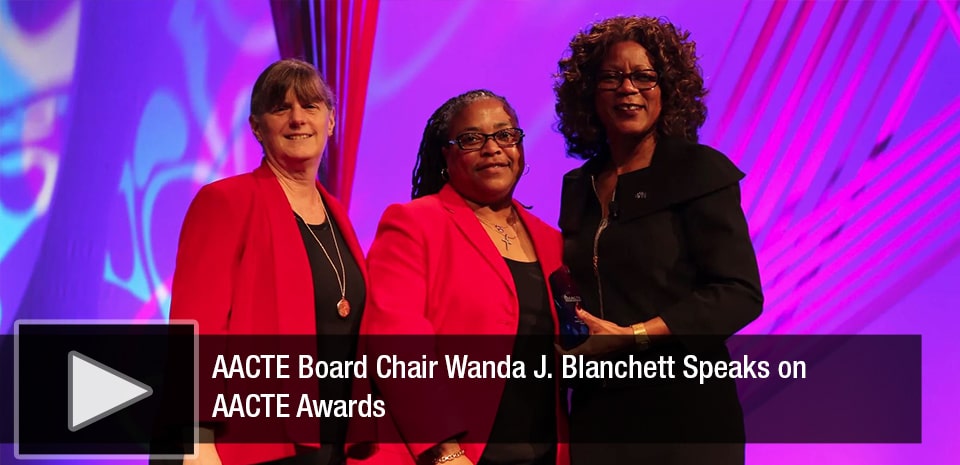
Greetings to my AACTE colleagues around the country!
As your AACTE Board of Directors chair and as a recent recipient of an AACTE Best Practice Award (on behalf of my institution), I encourage you to apply or nominate worthy individuals and programs for the 2019 AACTE awards. The call for entries is open through October 10, 2018.
19 Jun2018
By Kristin McCabe
Four new videos are available this week in AACTE’s Research-to-Practice Spotlight Series highlighting the urban residencies of the State University of New York (SUNY) Oswego School of Education. In these final videos of the series, educators discuss the significance of getting to know students well and how the yearlong clinical experience helps TESOL candidates prepare for edTPA–and beyond.
Participants in the clinical partnerships of the SUNY Oswego School of Education say one of the significant benefits of a yearlong residency is that teachers get to know their students well and engage deeply in their community.
05 Jun2018
By Kristin McCabe
Five new videos are available this week in AACTE’s Research-to-Practice Spotlight Series highlighting the urban residencies of the State University of New York (SUNY) Oswego School of Education. In the latest videos, educators discuss the professional growth they experience through their partnership work, the primary challenges they’ve faced, and advice they’d offer others looking to transition to a clinical residency.
Teachers of English as a new language (ENL) at Grant Middle School in Syracuse, New York, say they are fortunate to host preservice teachers from the SUNY Oswego TESOL program, who spend their full senior year working with them and other city schools in a coteaching residency.
01 Feb2018
By Kristin McCabe

Congratulations to the Rutgers University Graduate School of Education (New Brunswick, NJ) on its selection to receive the 2018 AACTE Best Practice Award in Support of Global and International Perspectives! The award will be presented March 1 at the Opening Keynote of the AACTE 70th Annual Meeting in Baltimore, Maryland.
The Rutgers Graduate School of Education (GSE) offers learning opportunities that link the local and global to connect future educators, leaders, and researchers to the reciprocal influences of local communities and global society. Teacher candidates may participate in several global opportunities, including education-study abroad programs, PK-12 mentoring, and a new linguistically diverse program, “The Conversation Tree: Community-Based Language Partnerships.”
03 Apr2017
By Sharon Brennan
The author and her collaborators will be presenting a free AACTE webinar Wednesday, April 12, 3:00-4:00 p.m. EDT on “Building Teachers’ Cultural and Global Awareness to ‘Reach and Teach’ All Students” (see this blog for more information). The views expressed in this post do not necessarily reflect the views of AACTE.
Various education-oriented groups have sounded the call for increasing attention to global competence among our nation’s PK-12 students. Recent reports from the Council of Chief State School Officers and the Asia Society, the Longview Foundation, the U.S. Department of Education, and the Organization for Economic Cooperation and Development have underscored the need to prepare all students to live and work in an interconnected, interdependent world. What does this mean for the preparation of their teachers?








 The IMPACT-PD grant—Improving Preschoolers’ Acquisition of Language through Coaching Teachers and Professional Development—is playing an integral role in providing preschool educators the tools they need to help their students develop proficiency in English as a second language.
The IMPACT-PD grant—Improving Preschoolers’ Acquisition of Language through Coaching Teachers and Professional Development—is playing an integral role in providing preschool educators the tools they need to help their students develop proficiency in English as a second language. Educators and students are facing unprecedented times. The challenges both students and their teachers confront today vastly affects the efficacy of even the best educator’s efforts to create and foster students’ zeal for learning and to contribute to the society they will one day shape. Yet, educators must stay committed to fulfilling their social responsibility now more than ever before.
Educators and students are facing unprecedented times. The challenges both students and their teachers confront today vastly affects the efficacy of even the best educator’s efforts to create and foster students’ zeal for learning and to contribute to the society they will one day shape. Yet, educators must stay committed to fulfilling their social responsibility now more than ever before.




 AACTE is delighted to announce Butler University College of Education as the recipient of the 2019 AACTE Best Practice Award in Support of Global and International Perspectives for its Global Network for Teacher Preparation program. Kelli Esteves, Butler College of Education (COE) associate professor and global coordinator, will be presented with the award at the AACTE
AACTE is delighted to announce Butler University College of Education as the recipient of the 2019 AACTE Best Practice Award in Support of Global and International Perspectives for its Global Network for Teacher Preparation program. Kelli Esteves, Butler College of Education (COE) associate professor and global coordinator, will be presented with the award at the AACTE  AACTE will honor announced Emily Evans Fanaeian as the recipient of the 2019 AACTE Outstanding Dissertation Award for Preparing Pre-service Teaches for Working with Linguistically Diverse Students: Examining University Teacher Preparation Programs Across the United States. The author completed her dissertation for the Ph.D. at the University of Wisconsin-Madison School of Education and is now the interim director of English as a Second Language/Bilingual Graduate Programs for the School of Education at Edgewood College (Madison, WI). She will be recognized formally with the award at the
AACTE will honor announced Emily Evans Fanaeian as the recipient of the 2019 AACTE Outstanding Dissertation Award for Preparing Pre-service Teaches for Working with Linguistically Diverse Students: Examining University Teacher Preparation Programs Across the United States. The author completed her dissertation for the Ph.D. at the University of Wisconsin-Madison School of Education and is now the interim director of English as a Second Language/Bilingual Graduate Programs for the School of Education at Edgewood College (Madison, WI). She will be recognized formally with the award at the 
